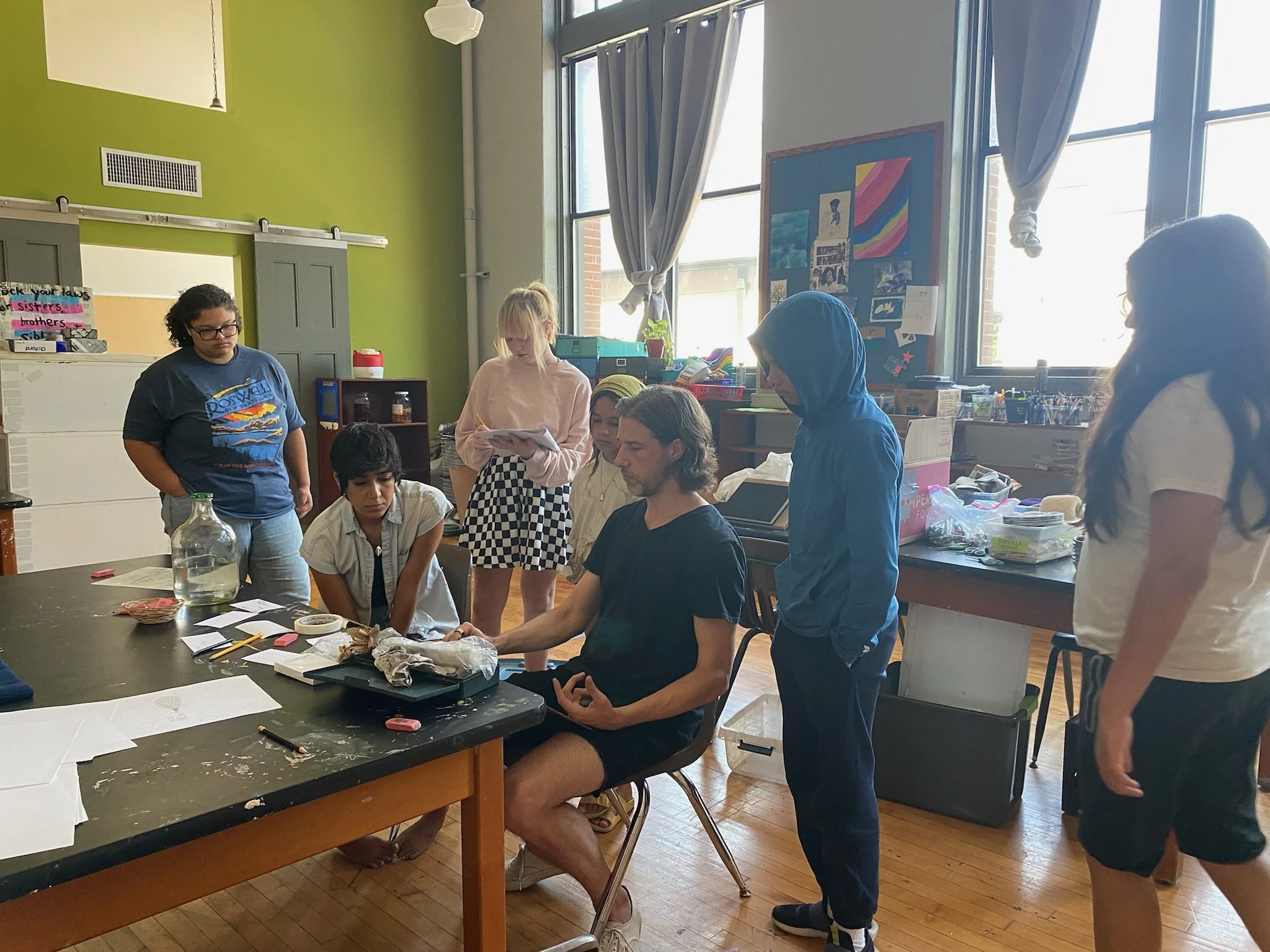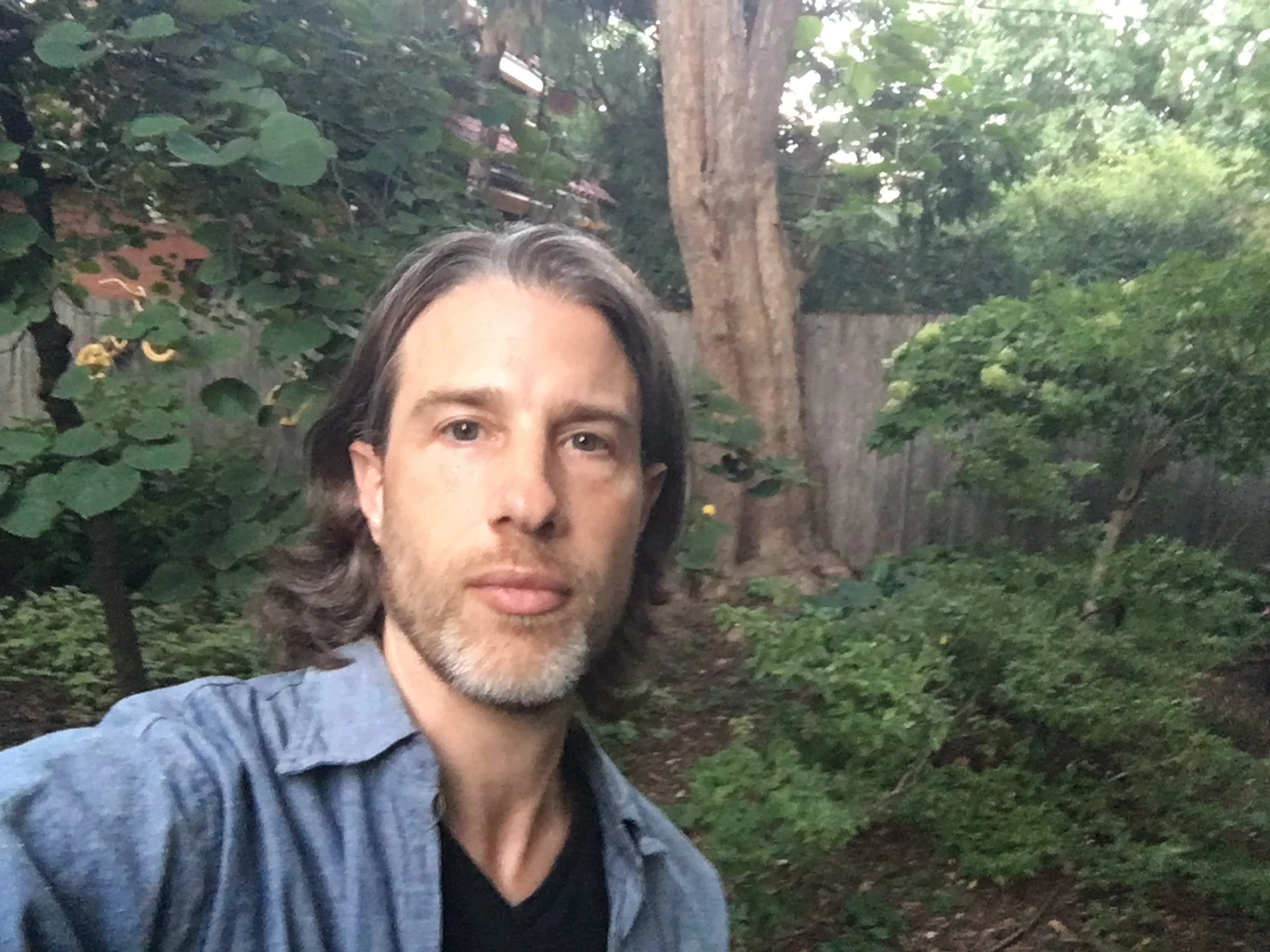Meet Saint Louis Sudbury School volunteer Nate Grundmann! We asked him a few questions recently about his work with the school, what he thinks about the Sudbury model, and more.
How did you get involved as a volunteer with Saint Louis Sudbury School?
I have some friends whose children attend. When I learned the school was looking for volunteers and substitute teachers I decided to apply because I have always enjoyed teaching, and I was curious about the Sudbury model.
What do you enjoy about volunteering at Sudbury?
I enjoy being in an environment where everyone is treated with dignity. No matter the age or role of the person, when you’re in the school there’s no hierarchy and no subordination. Everyone is equal. It’s a really good feeling.
Could you describe some of your favorite experiences at Sudbury?
I teach drawing at the school every Wednesday. Some students are mostly interested in drawing for fun without any specific learning goal, and I enjoy seeing their work and talking about it with them. Others have some specific goals, and it's been fun to see their progress.
I also enjoy seeing the School Meetings because the students get to vote on the decisions that directly affect the experience they will have at the school. It’s cool to see them being empowered like that. Their experience of the world matters as much as anyone else’s, and what better way to show that than to give them that influence?
What do you think of the Sudbury model?
I think the Sudbury model fills a really important niche in the educational system. The curriculum (or lack thereof) offers a great opportunity for students to individualize their education. I also really appreciate the democratic decision making, the lack of grading, and the rule creation/enforcement.
Curriculum
From the perspective of curriculum, I think the Sudbury model is a double-edged sword. On the one hand, while conventional models use a one-size-fits-all approach, at Sudbury the students are free to tailor their education to their needs and interests. I believe that students are more likely to enjoy their lives, be more engaged, and learn more, when they get to choose what they learn, how they learn it, and when.
On the other hand, the freedom at Sudbury makes it easier for students to disengage, to avoid exploration and challenging themselves. This can happen for many reasons: sometimes students may not see the value of learning something, or they may be intimidated by a subject, or they may think it will be boring (as a student I avoided subjects I thought I wouldn’t like, only to learn later that I enjoyed them and had missed an opportunity). So that is a real risk that should not be ignored.
You can take this last point as justification for an educational system that force-feeds students information. But it can also be seen as an invitation to help students overcome their tendencies to avoid being proactive and engaged. It’s important to note, though, that this help is not an inherent part of the Sudbury model, so this help may have to come from outside the school.
Grading
At Sudbury, students’ performance is not graded. While some students may thrive in a model that grades their performance, for others grades can have a damaging effect. For many students, grades are experienced as a source of approval and disapproval (which are internalized as pride and shame) to coerce them into learning subjects they aren’t motivated to learn. This approval/disapproval dynamic can reinforce the idea that one’s self-worth comes from outside of themselves (other’s opinions, accomplishments, etc.). The belief that self-worth is extrinsic has damaging emotional and psychological consequences.
Consider the person that believes their self-worth is extrinsic. When they risk failure or rejection it feels like they are risking their self-worth, and when they make a mistake (a necessary part of learning) it feels like their worth is diminished. This makes risking failure and rejection an anxiety-inducing experience. That’s a real problem, because people avoid things that cause anxiety and pain, so this person is more likely to avoid taking the risks they will need to take in order to learn and to create the lives they want. What’s more, when they do take these risks they are likely to perform more poorly because anxiety erodes performance (as many students experience when taking tests).
Alternatively, consider the person that believes their self-worth is intrinsic. Their self-worth is not at all in jeopardy when they risk failure and rejection. To them, their mistakes are simply opportunities for growth, and rejections are just speed bumps along the way. These students have greater levels of confidence and emotional resilience, and in general they perform better and are more satisfied in life.
Ironically, much of this satisfaction is rooted not in their improved performance, but rather in healthy core beliefs, such as the belief that they deserve to feel good no matter what they accomplish or who approves of them. Any external accomplishments or approval are just icing on the cake. But for the person who sees their self-worth as extrinsic, they will always be in pursuit of a deeper sense of satisfaction that can never be accessed via accomplishments and the approval of others.
It’s also important to note that students don’t need grades to evaluate their performance. They do that naturally when they care about their work. The more they care, the more they will strive for excellence. If excellence is important (and I’m not saying it is or isn’t), there are other ways to encourage it that don’t risk a distorted appraisal of self-worth.
Given that students don’t need grades to evaluate their performance, and considering the psychological and emotional risks that come with grading, I appreciate that grading isn’t a part of the Sudbury model.
Democratic Decision Making
At Sudbury, everyone in the community makes decisions together, democratically, no matter their age or role at the school. This reinforces the idea that everyone deserves to be heard and responded to, simply by virtue of being present. In this way, at Sudbury, intrinsic self-worth is not just an idea, it’s a practice.
Rule Creation and Enforcement
I also really appreciate the way the Sudbury model handles rule creation and enforcement. I won’t go into much detail about the mechanics because it would be too much to describe here, but I will say that the rules are created by a democratic process that includes the students, and I think the whole process treats the students with more dignity than in the other models I’ve seen. I have been a substitute in public schools as well as at Sudbury St. Louis, and from the perspective of a substitute, there is really no comparison. As a sub in public schools, you are expected to monitor the students for misbehavior, and this creates an adversarial dynamic between the students and substitutes. As a substitute at Sudbury, however, rather than being expected to police, I am expected to treat them with the same dignity and respect with which I would like to be treated, all according to the rules that they were an equal part of creating. In this way the Sudbury model practices the philosophy that everyone matters exactly as much as everyone else, and thus everyone has intrinsic worth.
Final Thoughts
Ultimately it’s important to acknowledge that there is no single model that is perfect for everyone. Depending on a student’s temperament and educational goals, Sudbury may or may not be the right option. It’s also vital to acknowledge that nobody’s educational journey is perfect. Though it’s important for a student to try to learn the most important subjects that will prepare them for whatever stage of life is next, it is also very important (perhaps more important than any specific subject) that a person develop the core psychological and emotional traits (intrinsic self-worth, emotional resilience, confidence, etc.) that will empower them to plot their course in life, care for themselves, handle life’s setbacks, and persevere to accomplish their chosen goals and create the life they want.
What has surprised you during your time at Sudbury?
The students are much more kind to one another than I remember students being when I was in school. It’s really refreshing.
What are you listening to, watching, or reading lately? And... what is your favorite food (if you have one)?
I recently rewatched Annihilation, a surreal Sci-Fi thriller written and directed by Alex Garland. It's such a good movie if you like stuff that is kinda existential, mind-bending, and very visually compelling. I also recommend a couple of Garland's other works, Devs and Ex Machina, for the same reasons. Besides that I am watching The Sandman, The Resort, and Reservation Dogs.
Lately some songs in my rotation are:
I'm a Kid by Jadu Heart,
Midnight Sun by Nilüfer Yanya,
Lipstick on the Glass by Wolf Alice,
Fantasmas by Ambar Lucid,
Hit Me Where it Hurts by Caroline Polachek
Food:
Can’t pick a favorite, but I’m pretty much always in the mood for Thai.






